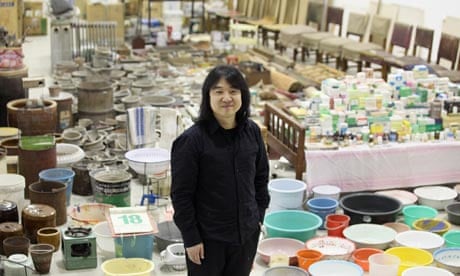Ten umbrellas, 16 chairs, three ancient radiators, innumerable medicine bottles and old boxes of tea – and that's just scratching the surface. On Tuesday, the Barbican in London opened its doors to reveal five decades' worth of possessions accumulated by Zhao Xiangyuan, the mother of the Chinese conceptual artist Song Dong, 46.
The 10,000 items, transported to London in two shipping containers, took a fortnight for Song and his family to arrange on the floor of the Barbican's corridor-like Curve gallery, creating a work called Waste Not. The slogan was drummed into the Chinese population during the cultural revolution: nothing was thrown away in case it could be used later.
After Song's father died in 2002, depression turned his mother's thrift into hoarding and her house in Beijing was stuffed with clutter. "I asked her why she wanted to fill the room with what to me is rubbish, and she said: 'If I fill the room, the things remind me of your father.'"
He suggested his mother should collaborate with him by arranging the possessions into an artwork. She agreed, and Waste Not was first exhibited at the Tokyo gallery in Beijing in 2005. "So many people came who had a similar life during the cultural revolution and talked to my mother for half a day at a time," said Song. "They told her: 'It's not your home, it's my home.' It got my mother out of her sadness – she said she had a second life."
The work was also shown at Moma in New York in 2009, the year Song's mother died. "For me, the most emotional items are the soap," he said, referring to a pile of what look like bricks. "When I got married my mother gave me it and I said: 'Why? I use a washing machine.' She was ashamed and said: 'I'll keep it for you.' When I started to do this work I learned that it's not soap, it's her love.'"
Born in 1966, Song's work has often tackled the cultural revolution's impact on his family, as well as China's changing political and cultural landscape. From 2003 to 2006, he made a series of sculptures out of biscuits called Eating the City, which were displayed, and consumed, in places including Selfridge's department store in London.
His 1996 work Breathing saw him lying face down in two locations in Beijing: Tiananmen Square and the frozen Houhai Lake.
Jane Alison, senior curator at the Barbican, said that Waste Not was "so personal and poetic … it helps us to understand the reality of Chinese history and culture in the 20th century in a way that newspapers can't".
